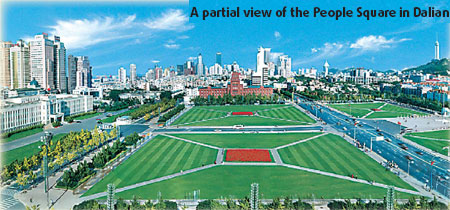Dalian: The shining pearl of the North
Updated: 2007-09-06 06:26

Dalian, a coastal city in Northeast China's Liaoning Province, is well known for its dynamic economy, growth potential and eco-friendly environment.
Situated in the south of the Liaodong Peninsula, the city is skirted by the Yellow Sea on the east and the Bohai Sea on the west.
Spread over 12,500 sq km, Dalian has a population of 6 million, its urban residents accounting for 68 percent of the total population.
As a key national industrial base, Dalian has a well-established industrial foundation.
With petrochemicals, electronic information, shipbuilding, and machinery and equipment manufacturing as its pillar sectors, Dalian is at the forefront of industrial output among the cities in Northeast China.
Meanwhile, the modern service industry is also emerging as a major growth driver for the city.
Currently, 71 financial institutes have established operations in Dalian, one-third of them being foreign-invested institutes.
The trade volume of soybean futures transacted at the Dalian Commodity Exchange is the highest in Asia and second highest in the world.
In recent years, Dalian has played host to a series of high-level international conferences, including the fourth Worldwide Chinese Life Insurance Meeting in 2002, the fifth Asia-Europe Economic Ministers' Meeting in 2003, a WTO informal ministerial meeting in 2005 and the ongoing Summer Davos.
A popular tourist destination, Dalian has a pleasant climate, beautiful stretches of seashore and a wealth of historical sites.
It was among the first batch of best tourism cities in China identified by the China National Tourism Administration in 2006.
In addition to the industry and service sectors, substantial progress is also being made in agricultural upgrading and restructuring.
Last year, 56 farm products processing companies were set up, each with an investment value of more than 10 million yuan. Meanwhile, the export of agricultural products reached $1.5 billion, an increase of 20 percent year-on-year.
According to data provided by the city government, the total output value of farming, forestry and fishing was registered at 39.05 billion yuan, increasing 13.9 per cent year-on-year.
The economic boom is backed by a highly skilled pool of research and development personnel.
The city has 22 universities and colleges with a total of about 280,000 students and 32 research institutes of city-level and above, where 23 members of the Chinese Academy of Sciences or the Chinese Academy of Engineering work.
The educational and research institutes provide strong intellectual support to the development of the city.
Capitalizing on its solid industrial basis and rich human resources, Dalian has gained an advantage in the race to garner investment.
A State-level economic and technological development zone, a hi-tech park, a tourism resort, and the only bonded port area and export-oriented processing zone in Northeast China are the mainstay of the city's ability to attract overseas investment.
Figures show that nearly 12,000 foreign-invested companies established their facilities in Dalian by the end of 2006, involving a total actual foreign investment of $22.25 billion.
Logistics hub
Neighboring the Shandong Peninsula across the sea and connected with the vast inland areas of Northeast China's three provinces and the Inner Mongolia Autonomous Region in North China, the city is seen as a key trade and finance center of strategic significance in the north of the country.
Meanwhile, its proximity to Japan, the Republic of Korea (ROK) and the Democratic People's Republic of Korea, as well as Russia, makes Dalian an important link on the Euro-Asia continent bridge.
The port city has developed into an international shipping hub and plays a vital role in spurring the growth of the local and neighboring economies.
Dalian port currently has commercial connections with more than 300 ports in about 160 countries and regions.
Statistics show that at least 70 percent of ocean shipments and 90 percent of overseas container transportation in Northeast China is shipped through Dalian port.
The Dalian Zhoushuizi airport serves 76 domestic and 43 international routes, connecting with 84 cities in 15 countries.
The fact that it is just a 50-minute flight away from both Beijing and Seoul, the capital of ROK, is evidence of Dalian's convenient location.
Its distinct advantage in terms of geographical location, combined with its comprehensive transportation network, create ideal conditions for the speedy development of Dalian's logistics sector.
So far, 45 renowned logistics companies such as Japan-based Itochu, Hong Kong SAR-based Orient Overseas and Taiwan Province-based TVL Group have set up operations in the Dalian Bonded Logistics Park.
Eco-friendly development
The city government has mapped out a sustainable development blueprint, which gives priority to both infrastructure construction and environmental protection.
In 1995, local authorities began mass renovation of old residential buildings and have to date offered new homes to more than 100,000 residents.
Since 1995, 160 factories have been moved out of the downtown area, leaving more than 6 million sq m for the development of residential buildings, squares and parks.
With the authorities intensifying their efforts to demolish illegal buildings and expand green coverage, the environment has improved significantly.
During the 10th Five-Year Plan (2001-05), Dalian's green coverage reached 42.8 percent.
Thanks to its eco-friendly environment, the city has won a number of environmental protection awards, like the Global 500 Roll of Honor in 2001 -- presented by the United Nations Environment Program (UNEP), and the China Habitat Award in 2002 by the Ministry of Construction.
(China Daily 09/06/2007 page68)
|
|
|
||
|
||
|
|
|
|